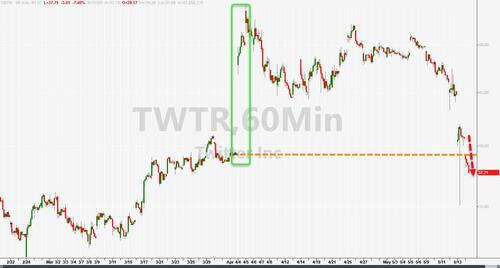
Update (1447ET): Is the Twitter deal dead? Musk seemed to suggest it was, unless he can buy the company for a lower price in light of 'bot-gate' which erupted over the weekend (see below).
Speaking at the "All In" summit, Musk said that a viable deal for Twitter is "not out of the question," but at a lower price.
He also challenged the truth and accuracy of Twitter's public filings.
Twitter's choice: admit Musk is right and it has a huge fake userbase, opening up existing management to countless shareholder lawsuits, or kill the deal and be sued for record shareholder value destruction.
— zerohedge (@zerohedge) May 16, 2022
* * *
Update (1426ET): Speaking virtually at the "All In" summit tech conference, Musk speculated that at minimum, Twitter is '20% bots,' before asking rhetorically whether it was potentially 80-90% bots.
He added that there's 'no way' to know the actual number of bots on the platform.
Later, Musk suggested that while he's historically voted for Democrats, he may vote Republican in the next election. According to the Tesla CEO, the Democratic party is 'overly controlled' by unions.
* * *
The fate of Elon Musk's Twitter deal - or at least the price he'll end up paying - may hinge on just how many 'spam' accounts are active on the social media platform.
The controversy began on Friday after Musk tweeted a Reuters article in which Twitter estimated that fake accounts comprise less than 5% of users, to which Musk said "Twitter deal temporarily on hold pending details supporting calculation that spam/fake accounts do indeed represent less than 5% of users," then added "Still committed to acquisition."
Still committed to acquisition
— Elon Musk (@elonmusk) May 13, 2022
Musk followed it up with a another tweet explaining that his team will do a “random sample of 100 followers of Twitter” to find out the percentage of fake accounts.
Then on Saturday, Musk tweeted "Whoever thought owning the libs would be cheap never tried to acquire a social media company!" - to which Twitter user @PPathole replied with a claim that "certainly more than 5%" of handles are "scam/spam/fake/bot" accounts.
"Exactly," Musk replied, adding "I have yet to see *any* analysis that has fake/spam/duplicates at <5%."
Another user, @BLKMDL3 said "Guarantee is 25%"
To which Musk replied on Sunday: "There is some chance it might be over 90% of daily active users, which is the metric that matters to advertisers."
There is some chance it might be over 90% of daily active users, which is the metric that matters to advertisers.
— Elon Musk (@elonmusk) May 15, 2022
Very odd that the most popular tweets of all time were only liked by ~2% of daily active users.
This sent Twitter CEO Parag Agrwal into meltdown mode - posting a 14-part thread to "talk about spam," with "the benefit of data, facts, and context."
Let’s talk about spam. And let’s do so with the benefit of data, facts, and context…
First, let me state the obvious: spam harms the experience for real people on Twitter, and therefore can harm our business. As such, we are strongly incentivized to detect and remove as much spam as we possibly can, every single day. Anyone who suggests otherwise is just wrong.
Next, spam isn’t just ‘binary’ (human / not human). The most advanced spam campaigns use combinations of coordinated humans + automation. They also compromise real accounts, and then use them to advance their campaign. So – they are sophisticated and hard to catch.
Some final context: fighting spam is incredibly *dynamic*. The adversaries, their goals, and tactics evolve constantly – often in response to our work! You can’t build a set of rules to detect spam today, and hope they will still work tomorrow. They will not.
We suspend over half a million spam accounts every day, usually before any of you even see them on Twitter. We also lock millions of accounts each week that we suspect may be spam – if they can’t pass human verification challenges (captchas, phone verification, etc).
The hard challenge is that many accounts which look fake superficially – are actually real people. And some of the spam accounts which are actually the most dangerous – and cause the most harm to our users – can look totally legitimate on the surface.
Our team updates our systems and rules constantly to remove as much spam as possible, without inadvertently suspending real people or adding unnecessary friction for real people when they use Twitter: none of us want to solve a captcha every time we use Twitter.
Now, we know we aren’t perfect at catching spam. And so this is why, after all the spam removal I talked about above, we know some still slips through. We measure this internally. And every quarter, we have estimated that <5% of reported mDAU for the quarter are spam accounts.
Our estimate is based on multiple human reviews (in replicate) of thousands of accounts, that are sampled at random, consistently over time, from *accounts we count as mDAUs*. We do this every quarter, and we have been doing this for many years.
Each human review is based on Twitter rules that define spam and platform manipulation, and uses both public and private data (eg, IP address, phone number, geolocation, client/browser signatures, what the account does when it’s active…) to make a determination on each account.
The use of private data is particularly important to avoid misclassifying users who are actually real. FirstnameBunchOfNumbers with no profile pic and odd tweets might seem like a bot or spam to you, but behind the scenes we often see multiple indicators that it’s a real person.
Our actual internal estimates for the last four quarters were all well under 5% – based on the methodology outlined above. The error margins on our estimates give us confidence in our public statements each quarter.
Unfortunately, we don’t believe that this specific estimation can be performed externally, given the critical need to use both public and private information (which we can’t share). Externally, it’s not even possible to know which accounts are counted as mDAUs on any given day.
There are LOTS of details that are very important underneath this high-level description. We shared an overview of the estimation process with Elon a week ago and look forward to continuing the conversation with him, and all of you.
To which Musk replied:
So how do advertisers know what they’re getting for their money? This is fundamental to the financial health of Twitter.
— Elon Musk (@elonmusk) May 16, 2022
Shares of Twitter are now at pre-acquisition rumor levels, trading below Musk's initial purchase basis...
Update (1447ET): Is the Twitter deal dead? Musk seemed to suggest it was, unless he can buy the company for a lower price in light of ‘bot-gate’ which erupted over the weekend (see below).
Speaking at the “All In” summit, Musk said that a viable deal for Twitter is “not out of the question,” but at a lower price.
He also challenged the truth and accuracy of Twitter’s public filings.
Twitter’s choice: admit Musk is right and it has a huge fake userbase, opening up existing management to countless shareholder lawsuits, or kill the deal and be sued for record shareholder value destruction.
— zerohedge (@zerohedge) May 16, 2022
* * *
Update (1426ET): Speaking virtually at the “All In” summit tech conference, Musk speculated that at minimum, Twitter is ‘20% bots,’ before asking rhetorically whether it was potentially 80-90% bots.
He added that there’s ‘no way’ to know the actual number of bots on the platform.
Later, Musk suggested that while he’s historically voted for Democrats, he may vote Republican in the next election. According to the Tesla CEO, the Democratic party is ‘overly controlled’ by unions.
* * *
The fate of Elon Musk’s Twitter deal – or at least the price he’ll end up paying – may hinge on just how many ‘spam’ accounts are active on the social media platform.
The controversy began on Friday after Musk tweeted a Reuters article in which Twitter estimated that fake accounts comprise less than 5% of users, to which Musk said “Twitter deal temporarily on hold pending details supporting calculation that spam/fake accounts do indeed represent less than 5% of users,” then added “Still committed to acquisition.”
Still committed to acquisition
— Elon Musk (@elonmusk) May 13, 2022
Musk followed it up with a another tweet explaining that his team will do a “random sample of 100 followers of Twitter” to find out the percentage of fake accounts.
Then on Saturday, Musk tweeted “Whoever thought owning the libs would be cheap never tried to acquire a social media company!” – to which Twitter user @PPathole replied with a claim that “certainly more than 5%” of handles are “scam/spam/fake/bot” accounts.
“Exactly,” Musk replied, adding “I have yet to see *any* analysis that has fake/spam/duplicates at <5%.”
Another user, @BLKMDL3 said “Guarantee is 25%”
To which Musk replied on Sunday: “There is some chance it might be over 90% of daily active users, which is the metric that matters to advertisers.“
There is some chance it might be over 90% of daily active users, which is the metric that matters to advertisers.
Very odd that the most popular tweets of all time were only liked by ~2% of daily active users.
— Elon Musk (@elonmusk) May 15, 2022
This sent Twitter CEO Parag Agrwal into meltdown mode – posting a 14-part thread to “talk about spam,” with “the benefit of data, facts, and context.”
Let’s talk about spam. And let’s do so with the benefit of data, facts, and context…
First, let me state the obvious: spam harms the experience for real people on Twitter, and therefore can harm our business. As such, we are strongly incentivized to detect and remove as much spam as we possibly can, every single day. Anyone who suggests otherwise is just wrong.
Next, spam isn’t just ‘binary’ (human / not human). The most advanced spam campaigns use combinations of coordinated humans + automation. They also compromise real accounts, and then use them to advance their campaign. So – they are sophisticated and hard to catch.
Some final context: fighting spam is incredibly *dynamic*. The adversaries, their goals, and tactics evolve constantly – often in response to our work! You can’t build a set of rules to detect spam today, and hope they will still work tomorrow. They will not.
We suspend over half a million spam accounts every day, usually before any of you even see them on Twitter. We also lock millions of accounts each week that we suspect may be spam – if they can’t pass human verification challenges (captchas, phone verification, etc).
The hard challenge is that many accounts which look fake superficially – are actually real people. And some of the spam accounts which are actually the most dangerous – and cause the most harm to our users – can look totally legitimate on the surface.
Our team updates our systems and rules constantly to remove as much spam as possible, without inadvertently suspending real people or adding unnecessary friction for real people when they use Twitter: none of us want to solve a captcha every time we use Twitter.
Now, we know we aren’t perfect at catching spam. And so this is why, after all the spam removal I talked about above, we know some still slips through. We measure this internally. And every quarter, we have estimated that <5% of reported mDAU for the quarter are spam accounts.
Our estimate is based on multiple human reviews (in replicate) of thousands of accounts, that are sampled at random, consistently over time, from *accounts we count as mDAUs*. We do this every quarter, and we have been doing this for many years.
Each human review is based on Twitter rules that define spam and platform manipulation, and uses both public and private data (eg, IP address, phone number, geolocation, client/browser signatures, what the account does when it’s active…) to make a determination on each account.
The use of private data is particularly important to avoid misclassifying users who are actually real. FirstnameBunchOfNumbers with no profile pic and odd tweets might seem like a bot or spam to you, but behind the scenes we often see multiple indicators that it’s a real person.
Our actual internal estimates for the last four quarters were all well under 5% – based on the methodology outlined above. The error margins on our estimates give us confidence in our public statements each quarter.
Unfortunately, we don’t believe that this specific estimation can be performed externally, given the critical need to use both public and private information (which we can’t share). Externally, it’s not even possible to know which accounts are counted as mDAUs on any given day.
There are LOTS of details that are very important underneath this high-level description. We shared an overview of the estimation process with Elon a week ago and look forward to continuing the conversation with him, and all of you.
To which Musk replied:
So how do advertisers know what they’re getting for their money? This is fundamental to the financial health of Twitter.
— Elon Musk (@elonmusk) May 16, 2022
Shares of Twitter are now at pre-acquisition rumor levels, trading below Musk’s initial purchase basis…







